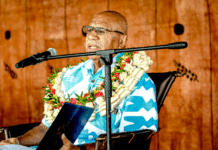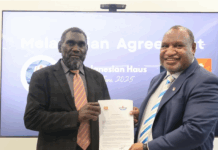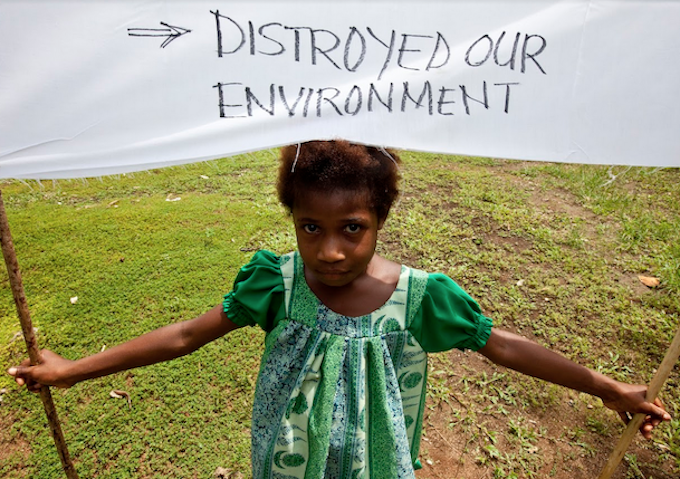
Asia Pacific Report newsdesk
Australia is accused of using “diplomatic strong-arm tactics” to water down outcomes in Pacific climate negotiations and “buy silence” on climate change, a new report has revealed.
Greenpeace Australia Pacific’s report, Australia: Pacific Bully and International Outcast, reveals that the Australian government uses “bullying tactics” in regional negotiations on climate change, according to former Pacific Island leaders interviewed as part of the study.
The leaders include former Kiribati President Anote Tong and former Prime Minister of Tuvalu Bikenibeu Paeniu.
- READ MORE: Australia’s ‘dirty’ coal hypocrisy threatens Pacific climate security
- Other COP26 reports
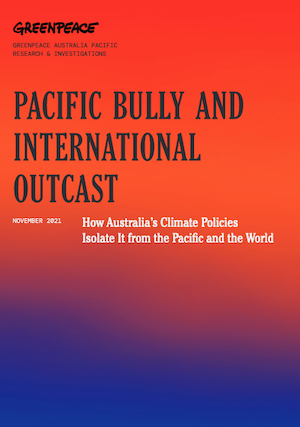
Australia’s aid to the Pacific has been “greenwashed”, with some of the largest and most expensive “climate adaptation” projects having no link to climate change or contributing to increase the climate resilience of Pacific peoples.
The Australian government’s climate position harms its international relations and economy with Australia’s export markets for coal and gas shrinking as major trading partners such as Japan and South Korea commit to net-zero emissions, says the report, published coinciding with the COP26 climate summit in Glasgow.
The report draws on dozens of interviews with present and former Pacific leaders, Australian diplomats and academics to expose the hardline tactics used by Australia to thwart stronger regional action on climate change and to shift focus away from Australia’s responsibility to reduce greenhouse gas emissions.
The report also uncovers the greenwashing of Australian aid in the Pacific, finding that millions of aid dollars have been given to “climate adaptation” projects that do not have any link to climate change.
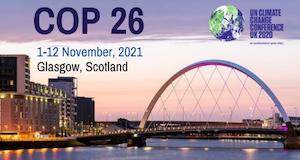
Australian standing damaged
Greenpeace Australia Pacific researcher and international relations expert Dr Alex Edney-Browne said the investigation showed Australia’s international standing had been damaged by its climate obstruction.
“Australia has lost its once-respected position in the Pacific and now has a reputation for bullying and strong-arm diplomatic tactics to thwart regional climate action,” she said.
“Pacific Island leaders are some of the world’s strongest climate advocates, but Australia has brazenly tried to buy their silence through aid with strings attached.
“Morrison’s last-minute commitment at COP26 this week to increase regional climate finance by $500 milion, via bilateral agreements, simply won’t cut it. Given the level of greenwashing going on in Australia’s foreign aid to the Pacific as revealed in this report, there is also no guarantee that this money will go where it’s needed to increase the climate resiliency of Pacific peoples,” she said.
“Australia has a history of using bilateral aid as a way of gaining leverage over Pacific island countries. It would be nice to see Australia being a good international citizen and showing support for multilateral climate finance such as the UN’s Green Climate Fund. It refuses to do so.
“Australia must make a serious effort on climate change, which is threatening the very survival of Pacific nations. That means ruling out any new coal or gas projects, ending the billions in subsidies given to the fossil fuel industry and committing to a science-based target to cut emissions by 75 percent this decade to bring it up to speed with our regional neighbours and trading partners.”
Gareth Evans, a former Australian foreign minister, said Australia’s climate policy was already hurting the country’s diplomatic standing.
‘Reputation for decency’
“A country’s reputation for decency in these matters does really, really matter… Australia’s credibility in all sorts of ways depends on our being seen to be responsible, good international citizens and Australia is putting that reputation very much at risk on the climate front,” he said.
Anote Tong, former President of Kiribati, said Australia had not acted in the spirit of mutual respect in its dealings with the Pacific on climate change.
“I cannot read into the minds of Australian leaders but it’s always been my hope that we would treat each other with mutual respect, but I’m not sure this has always been the case,” he said.
“But we should be partners in every respect and not when it is convenient to one party but not the other, for example on climate change. We expect Australia to be stepping forward because climate change is very important for us and we’re meant to be part of this family. It had always been my expectation, my hope, that Australia would provide the leadership we desperately need on climate change.”
Dr Matt McDonald, associate professor of International Relations at University of Queensland, refers to Australia’s climate policies as a “perfect storm”, with serious repercussions for the country’s regional and international relations if these policies remain weak by comparison with similar developed countries.






